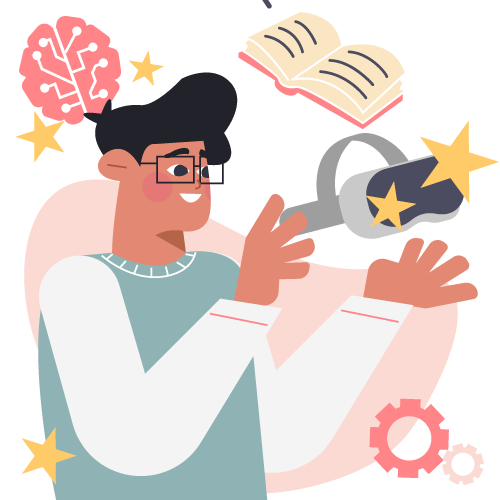You are probably here to learn more about what soft skills teaching for employees involves. This guide should provide you with helpful information you can use for your organization.
What are Soft Skills?
Soft skills are interpersonal skills that aren’t traditionally taught in a typical educational setting and can be utilized across professions. Soft skills typically involve how people relate to each other in life and in the workplace, such as communication, adaptability, and creative thinking to name a few.
While much focus is often put on hard (or technical) skills in hiring, employers are often also looking for job candidates with the right set of soft skills to achieve career success. So what are soft skills and who needs them? These are the common skills that one needs to engage in regular day-to-day work regardless of your occupation.
Here are some of the common soft skills employers look for:
- Adaptability
- Communication
- Creative thinking
- Reliability
- Work ethic
- Teamwork
- Positivity
- Time management
- Motivation
- Problem-solving
All professions and jobs require people to work on various tasks each day that require a specific knowledge base or technical skill. Someone can be excellent with these job-specific functions, but their lack of time or work management skills makes them ineffective. Teams with members who have both hard and soft skills tend to be more efficient and work together better. And while many hard skills are useful for only certain jobs within an organization, soft skills are easy to transfer to multiple professional fields!
That’s why teaching soft skills makes employees highly adaptable and successful professionals. However, cultivating soft skills is an ongoing learning journey.
We all know that personality traits and communication abilities are essential for job success and navigating relationships and difficult interpersonal situations in the workplace, but did you know that the term “soft skills” started in the U.S army late in the 1960s? The military used it to refer to any skill that didn’t require the employee to use machines. The term helped the military differentiate skills that were technical and the interpersonal skills necessary for many jobs. Since then, employers have also increasingly recognized the importance of such skills when hiring professionals. In fact, soft skills have become as crucial as hard skills when hiring.
The Importance of Soft Skills in the Workplace
There are various reasons for teaching soft skills to employees. Let’s go over a few..
Taking Initiative
Initiative is an essential skill that employees in an organization need to achieve consecutive goals. Initiative is more than just showing determination to cpmplete the tasks you’re assigned. Taking initiative shows that you’re thinking ahead and coming up with solutions instead of just noting the problems..
Showing initiative involves cultivating a positive attitude and being creative in handling day-to-day obligations. This soft skill makes it easy for the employee to follow through on ideas and find innovative solutions to challenges at work. Developing Leadership
Leadership is another crucial soft skill. Leaders are aware of how their attitudes and habits affect others in the workplace and understand how to motivate different types of personalities and mitigate conflict. These are all critical aspects of outstanding leadership in the workplace. Developing leadership abilities can help people adapt to different work settings more easily and determine the strategies and measures for professional excellence more effectively.
Employee Retention
Longevity is one of the main factors an employer is hoping for when hiring staff. High employee turnover is costly in time, money, and energy. Organizations with excellent employee retention levels often experience high levels of professional efficiency. Employees with appropriate soft skills adapt easily to changing work environments and personality types. Adaptable employees are less likely to leave a company due to personnel or other culture changes.
Teamwork
Work on any team requires cooperation and collaboration. Skills such as active listening, empathy, and communication help create a productive and highly collaborative workplace.
Customers and Clients Need Soft Skills
Customers today have almost endless options when it comes to making purchases of products or services. For consumers, customer service is a top consideration, which is where soft skills can become essential for organizations looking to improve call center operations and enhance overall customer experiences.
Being able to communicate with empathy and understanding is a critical aspect of the success of any business. These skills allow the professionals who deal with customer support queries to provide meaningful answers and make the consumer feel heard. Excellent communicators are adaptable and can handle difficult questions and emotional customers with grace and ease.
Communication skills also significantly impact the quality of information and responses that the customer support team can provide, particularly in the technical arena. When customers need technical support, they’re looking for someone knowledgeable about the technical aspects of their issue (hard skills) who can explain those technical details to a lay person (soft skill). An employee with only the hard skills may not be able to adapt their communication to the appropriate technical level needed for an individual consumer.
Increasing Sales
Sales are an important goal for any business, and the customer support team plays a significant role in this process. Soft skills are crucial in the way employees leverage their abilities to help the organization address challenges and meet its goals. The sales an organization makes rely on the efficiency of the various departments in the organization. Both marketing and sales require an understanding of human behavior as well as excellent listening skills, communication skills, and empathy. There is no one-size-fits-all sales pitch, and excellent sales and marketing teams hone their soft skills to be able to adapt their sales pitch to the needs of each individual prospect.
Hard Skills vs. Soft Skills
Hard skills refer to the competencies that an individual requires to perform the roles and responsibilities of a specific job. The hard skills allow the employee to execute and complete particular work tasks. These are often the skills that are learned in a traditional educational institution—it’s the physics and engineering used to design a plane or the knowledge of labor law someone in human resources uses.
However, you should also realize that hard skills aren’t only confined to the technical skills and concrete knowledge categories. People-oriented positions such as sales require hard skills such as data management, market research, and strategic management.
Hard skills are crucial for success in any modern workplace setting. They allow the employees to develop new solutions through various specialized skills.
While hard skills require that the individual develops administrative or technical competence skills, soft skills often relate to the emotional aspect of people. Hard and soft skills often need to go together for an employee to accomplish their goals..
In the past, employers focused on finding employees with the right hard skills to perform their job functions. Their success at work only correlated with individuals’ technical ability in completing tasks. Therefore, companies used to hire professionals primarily based on their objective competencies.Hard skills are essential resources in the business setting and can influence the success of an organization. But most professionals would agree that, in the modern workplace, hard skills without the necessary soft skills don’t get the job done.
Types of Hard Skills
There are various types of hard skills, which fall into the following categories:
People-Oriented
While we normally think of people-oriented skills as soft skills, there are also people-oriented hard skills. For instance, there are scientific aspects to psychology and human behavior that would be considered hard skills. There’s a difference between the hard skill of knowing how someone’s brain may be processing emotions, and having the soft skills of empathy and communication to have a conversation with that person to de-escalate a conflict or work through their problem. The same goes for communication in the workplace. While an attorney may have the listening and persuasion skills (soft skills) to convince a jury, they also need an incredible grasp of vocabulary and grammatical rules (hard skills) to write their briefs. These skills go along with the hard skill of their knowledge of the law to create a winning case.
Research & Analysis
The average business employee requires multiple hard skills for organizational excellence. Professionals must be able to extract, interpret, and present data helpfully. Resources such as word processing, statistical analysis skills, web scraping techniques and more are crucial in that process. Hard skills often require the analytical side of business professionals, while soft skills often fall into the emotional category.
Manual Skilled Labor
These involve the various skills one might require for professionals in manufacturing, construction, or plumbing. These skills require professional training and experience to achieve the best results. Manual skilled labor usually requires refresher training courses to keep up with advancements in the field.
Professional Services
Professional services such as IT, dentistry, or healthcare require that individuals engage in training programs over time because professional competencies vary and often focus on a detailed knowledge of a specialization. These hard skills usually require the individual to have some form of certification or licensing to get a position in the workplace.
Creative Hard Skills
Creativity has long been considered a soft skill, but when it comes to many modern professions, the creative soft skills won’t get you far without the associated hard skills. The common skills in this category include copywriting, graphic design, and video editing. Many of these hard skills involve the ability to use specific software that frequently changes as technology changes. Fortunately, training in these skills is readily available through online sources or platforms and does not always require formal schooling.
Strategies for Teaching Soft Skills in the Workplace
For many years, there was a common perception that the main difference between hard and soft skills was that hard skills were learnable and soft skills were innate. You were either a good listener or you weren’t. As time passed, it became clear that soft skills are teachable. There are various strategies that companies can use to teach soft skills in the workplace, including:
Develop a Learning Mindset
Developing soft skills such as emotional intelligence and resilience is excellent for any business setting. Moreover, agility, strength, and cultural intelligence have become crucial survival skills. The awareness people have of these skills has increased significantly over the years, which makes employees more intuitive and aware of how a workforce can interact. One of the first soft skills to encourage in your workforce is a learning mindset. In order to learn soft skills, your employees must be open to learning. Incentivize a learning mindset through rewards for employees who complete programs successfully, model the mindset for your employees, and create the time and space for them to learn on company time.
Encourage Self Reflection
Employees have to know which soft skills they lack in order to be open to developing them. Therefore, before you start asking employees to sign up for courses, ensure you determine which soft skills that are most necessary for your team. Then, encourage self-reflection. By understanding which soft skills are necessary for success and where they fall on that skill spectrum, employees can ensure they’re developing the right skills for success.
Expand Knowledge and Understanding
Resources such as training programs and seminars that you might encounter at local events can be excellent for teaching your employees the right hard skills they need for the business. It is also important to come up with appropriate ways for teaching soft skills that employers need. You can use online training programs, videos, and personalized eLearning courses, which can help acquire targeted knowledge and master the required skills.
Provide Opportunities for Practice
Ever heard the saying, “practice makes it perfect?” Well, this saying also applies to the traditional workplace. Learning loss happens with soft skills the same way it does with hard skills. There’s another saying about practice as well. “Use it or lose it.” Ensure your employees receive ample time and opportunities to practice the hard and soft skills they learn..
Remember that practice and self-reflection are resources that go hand in hand. Employees that engage in consistent self-reflection are more self-aware and recognize when their skills need some brushing up.
Provide Feedback
Feedback is an essential resource for any professional who wants to learn a new skill. The employee or individual is likely to come across various challenges in learning a new job. With feedback, the professional will be better positioned to address their mistakes and move on to new goals.
The feedback, however, has to be continual and address the specific learning needs that the employee might have. And remember that feedback shouldn’t only be corrective. Employees also rely on you to let them know what they’re doing right even more than what they’re doing wrong. And employees who only ever hear about their mistakes can become frustrated and unmotivated.
Use Mentors
Mentors are essential in the learning experiences that employees can have in an organization. Mentors provide first-hand insight the individual can use to improve.
The mentor can also be available through mobile phones or social media platforms. It makes it easy for the professional to consult an experienced individual when they require insight and information about a specific task. The mentor can be someone in your organization or you can outsource this process to an agency.
As you have seen, both hard and soft skills are essential for success in any work environment. Teaching employees what soft skills are and cultivating the right skills for organizational success can have many unique benefits.
We recommend that you learn about ELM’s soft skills training services to help take your business to the next level!






